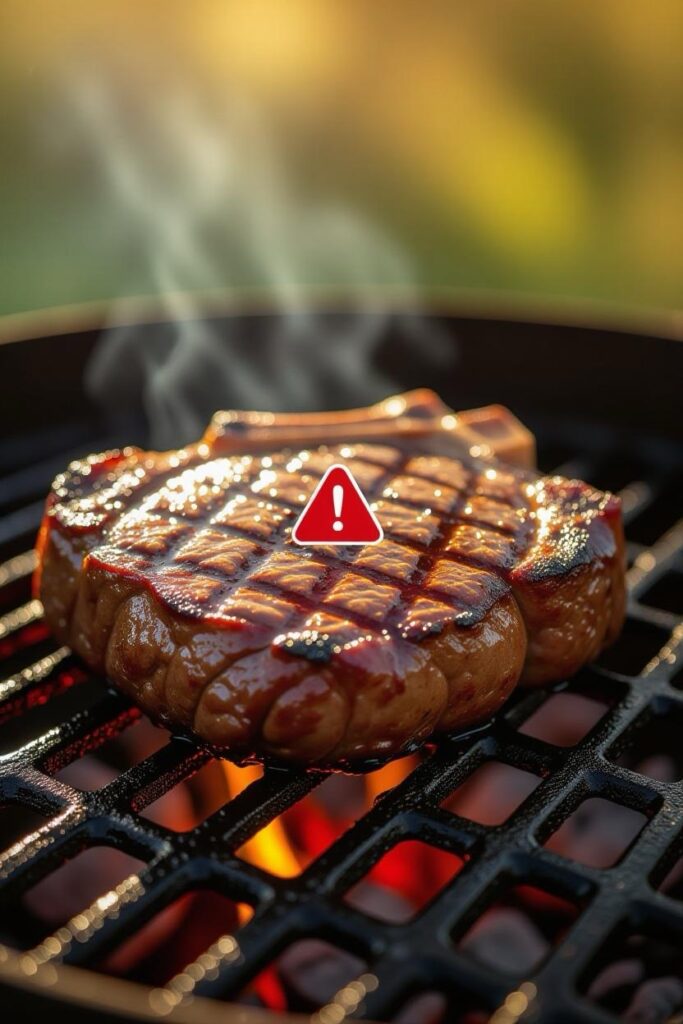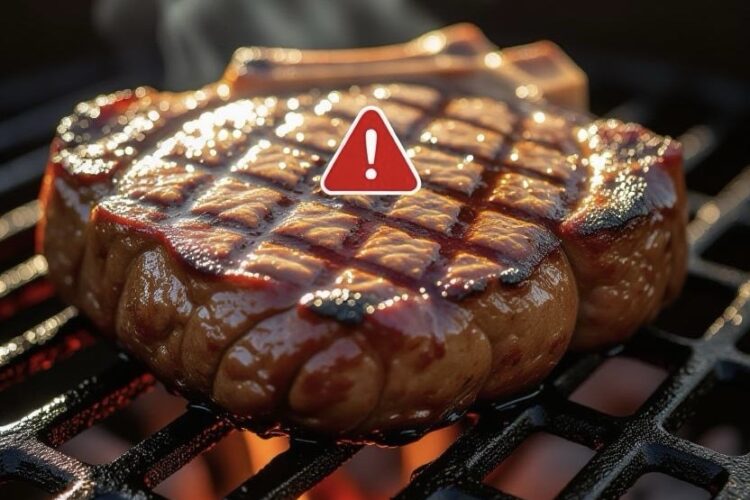Cooking meat at high temperatures through grilling, barbecuing, or frying can produce carcinogens like heterocyclic amines (HCAs) and polycyclic aromatic hydrocarbons (PAHs), which may increase cancer risk. These form when amino acids, creatine, and fat in red or processed meats react under heat, especially in charred or well-done portions. Studies link these to colorectal, pancreatic, prostate, breast, liver, and lung cancers due to DNA damage. To reduce risks, marinate meat with herbs or vinegar, use lower heat, trim fat, or microwave briefly before grilling. Opt for lean meats or poultry, and pair with vegetables to counter harmful effects. By adjusting cooking methods, you can enjoy grilled meat while minimizing potential health concerns.
Long Version
Charred Meat and Cancer Risk: What You Need to Know
The allure of a backyard barbecue or a sizzling steak on the grill is hard to resist, but beneath the smoky aroma lies a potential health concern: the link between charred meat and cancer risk. When meat is cooked at high temperatures through methods like grilling, barbecuing, smoking, pan frying, or frying, chemical reactions can produce carcinogens that may contribute to DNA damage and the development of tumors. This connection has been explored in numerous epidemiologic studies and population studies, highlighting how dietary exposure to these compounds from meat consumption, particularly red meat and processed meats, could elevate risks for various cancers. Understanding this isn’t about abandoning your grill—it’s about making informed choices to minimize harm while enjoying your meals.
How Carcinogens Form in Cooked Meat
The process begins with the cooking methods themselves. High temperatures trigger reactions in muscle proteins, amino acids, creatine, and creatinine found naturally in meat. These interactions form heterocyclic amines (HCAs), also known as heterocyclic aromatic amines (HAAs), which are mutagenic compounds capable of altering DNA and promoting cancer through bioactivation in the body. For instance, well-done meat or burnt meat cooked over an open flame tends to accumulate higher levels of HCAs like PhIP (2-amino-1-methyl-6-phenylimidazo[4,5-b]pyridine), a potent carcinogen linked to cellular mutations.
Simultaneously, polycyclic aromatic hydrocarbons (PAHs), including benzopyrene (benzo[a]pyrene), emerge when fat from meat drippings hits hot surfaces or flames, creating cooking smoke that adheres to the food. This is especially pronounced in barbecuing and grilling, where charred portions and blackened areas on the meat’s surface absorb these harmful substances. Smoke inhalation during the process can also introduce PAHs into the body. Additionally, red meat contains heme iron, which can catalyze the formation of N-nitroso compounds in the gut, further compounding cancer risk through oxidative stress and inflammation.
Animal models have demonstrated how these carcinogens cause direct DNA damage, leading to tumor formation in organs like the colon and prostate. In human contexts, the extent of exposure depends on factors such as cooking duration, temperature, and meat type—processed meats often exacerbate the issue due to added preservatives that can form more N-nitroso compounds.
Types of Cancers Associated with Charred Meat Consumption
Extensive research ties high meat consumption, especially of grilled meat and charred varieties, to increased cancer risk across multiple sites. Colorectal cancer and colon cancer top the list, with studies showing a 16-25% higher risk for every 50 grams of processed meats consumed daily. Pancreatic cancer risks rise with frequent intake of well-done meat, as HCAs and PAHs interfere with pancreatic cell function.
Prostate cancer has been linked to PhIP exposure from charred meat, particularly in men who prefer their steaks heavily grilled. Breast cancer associations emerge from population studies, where women consuming high levels of barbecued or smoked meat show elevated risks, potentially due to bioactivation of HCAs in breast tissue. Liver cancer and lung cancer risks increase with chronic dietary exposure, as PAHs from cooking smoke and charred portions can be metabolized into DNA-damaging agents that affect hepatic and pulmonary cells.
Gastrointestinal tract cancer, encompassing stomach and esophageal varieties, is also implicated, with heme iron and N-nitroso compounds playing key roles in irritating the lining and promoting tumor growth. While direct causation in humans remains probabilistic—classified by the International Agency for Research on Cancer as “probably carcinogenic” for red meat—animal models consistently replicate these effects, underscoring the mutagenic potential.
Evidence from Scientific Studies
Epidemiologic studies, including large-scale population studies, provide robust data on these risks. For example, a comprehensive review of 19 prospective studies found elevated colon cancer rates with higher beef intake, attributing much of it to cooking methods that produce HCAs and PAHs. Animal models exposed to diets rich in these carcinogens develop tumors mirroring human pathologies, offering mechanistic insights into DNA damage and bioactivation processes.
Recent perspectives from 2025 highlight that while no direct human trials prove causation, the cumulative evidence from dietary exposure patterns is compelling. Factors like genetic susceptibility and overall meat consumption amplify these risks, with processed meats posing a higher threat due to additional N-nitroso compounds.
Strategies to Minimize Risks
Fortunately, simple adjustments to cooking methods can significantly reduce carcinogen formation. Marinating meat in mixtures with vinegar, lemon juice, wine, herbs, and spices creates a barrier that lowers HCA and PAH levels by up to 90%. Microwaving meat for two minutes before grilling removes excess fat and juices, slashing HCA content dramatically.
Opt for lower temperatures or indirect heat to avoid direct flame contact, and trim fat to minimize meat drippings that fuel PAH production. Choose leaner cuts of red meat or alternatives like poultry and fish, which form fewer HCAs. Pairing grilled meat with antioxidant-rich fruits and vegetables can counteract harmful effects, further mitigating long-term cancer risk. Limiting processed meats and varying protein sources also helps balance overall dietary exposure.
Final Insights
Charred meat’s appeal doesn’t have to come at the cost of health. By understanding how high temperatures in grilling, barbecuing, and other methods generate carcinogens like HCAs, PAHs, PhIP, benzopyrene, and N-nitroso compounds from amino acids, creatine, creatinine, and heme iron, you can adopt safer practices. Backed by epidemiologic studies, population studies, and animal models, the evidence points to heightened risks for colorectal cancer, pancreatic cancer, prostate cancer, breast cancer, liver cancer, lung cancer, and gastrointestinal tract cancer from excessive meat consumption of burnt or well-done varieties. Yet, with mindful cooking tweaks, you can savor the flavors while safeguarding your well-being, turning potential risks into informed enjoyment.

Hashtags For Social Media
#CharredMeatCancer #GrillingCancerRisk #BBQCancerDanger #HealthyGrillingTips #CancerPrevention #RedMeatRisks #ProcessedMeatsWarning #CarcinogensInFood #BurntMeatHazards #GrillSafely #FoodSafetyFacts #NutritionAndHealth #DietCancerLink #MeatConsumptionRisk #WellDoneMeatAlert #HCAsAndPAHs #HemeIronDangers #ColorectalCancerAwareness #PancreaticCancerRisk #ProstateCancerPrevention #BreastCancerFacts #LiverCancerWarning #LungCancerLink #GastrointestinalHealth #CancerAwarenessMonth #HealthTipsDaily #WellnessJourney #FitnessAndNutrition #HealthyEatingHabits #ViralHealthHacks
Related Questions, Words, Phrases
does charred meat cause cancer | is grilling meat bad for you | cancer risks from barbecued meat | how does burnt meat lead to cancer | grilled meat and carcinogens explained | does overcooked meat increase cancer risk | charred food cancer connection | barbecue cancer dangers | well done steak cancer link | hc as in grilled meat | pahs and meat cooking risks | red meat grilling health effects | processed meats cancer from charring | does smoking meat cause tumors | high temperature cooking cancer | dna damage from charred proteins | heterocyclic amines in bbq | polycyclic aromatic hydrocarbons in grilled food | n-nitroso compounds in red meat | heme iron cancer role in grilling | colorectal cancer from barbecues | pancreatic cancer grilled meat link | prostate cancer charred steak | breast cancer barbecued chicken risk | liver cancer from smoked meats | lung cancer cooking smoke | gastrointestinal cancer burnt food | ways to reduce cancer risk when grilling | marinating meat to prevent carcinogens | safe grilling temperatures | microwave before grilling benefits | lean meat vs fatty for cancer prevention | antioxidants against grilled meat risks | epidemiologic studies on charred meat | animal models charred food cancer






